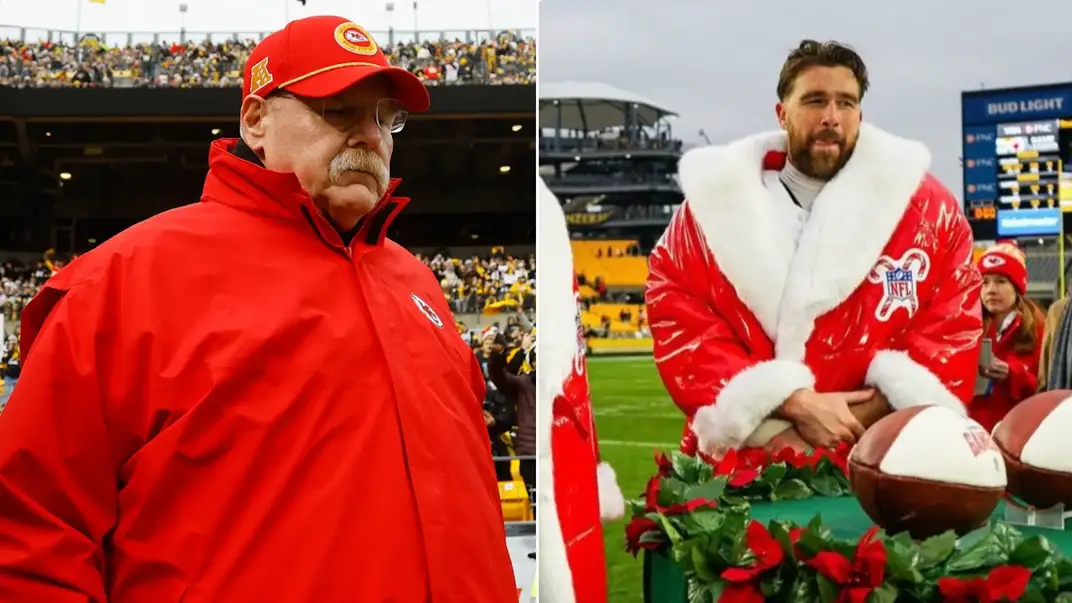
The Christmas Day matchup was already a highly anticipated game, with both teams fighting for playoff positioning. The Chiefs, having already secured their spot in the postseason, were looking to fine-tune their lineup, while the Steelers were still in the thick of the playoff hunt and needed every win they could get. Despite the high stakes on the field, the pre-game scene became the focal point after Kelce chose to kneel during the national anthem, an act that stirred controversy among fans, analysts, and even teammates.
Kelce’s decision to kneel was not a new gesture; it was part of a broader wave of NFL players using their platforms to protest racial injustice and inequality. Over the years, several players have taken a knee during the anthem, including former quarterback Colin Kaepernick, whose protest in 2016 sparked a national conversation about race relations and police brutality. While many players have continued to engage in such protests, they have often faced backlash, both from fans and team management, as it remains a polarizing issue in the world of sports.
For Reid, a coach known for his pragmatic and disciplined approach to leadership, the act of kneeling was seen as disruptive to the team’s focus. After the game, Reid addressed the media, expressing his disappointment in Kelce’s decision to protest during such a high-profile game. “We have to focus on what’s best for the team and what’s best for the fans,” Reid said in his post-game comments. “We can’t have distractions like this, especially on a day as important as Christmas Day, where everyone is tuning in to watch us perform.”
Reid’s stance was clear: while he respected his players’ right to express themselves, he felt that the timing and setting of the protest were inappropriate. The holiday season, Reid argued, should be a time for unity and celebration, not division. “We’ve got to stop this nonsense and focus on the game,” he added, referring to the protests that have continued to make headlines in recent years. “There’s a time and a place for everything, and this was not the right time.”
Kelce, who had been a central figure in the Chiefs’ high-powered offense for years, was visibly upset by the suspension. In a statement released shortly after Reid’s announcement, Kelce expressed his commitment to using his platform to speak out on issues of social justice. “I’ve always believed in standing up for what’s right, and I won’t stop voicing my support for equality,” Kelce said. “But I also understand my coach’s decision, and I will respect it. I’ll take the suspension in stride and focus on the team’s goals for the future.”
The suspension of Kelce raised questions about the NFL’s ongoing struggle to balance players’ rights to protest with the league’s desire to maintain a unified front. Over the years, the NFL has seen a significant shift in how it handles player protests, with some teams and coaches fully supporting their players’ right to speak out, while others, like Reid, have taken a more conservative approach. The issue has become a lightning rod for debate, with many fans feeling that the protests have no place in a sport that is meant to provide entertainment and escape from real-world issues.
The backlash to Kelce’s suspension was swift. Many players, both within the Chiefs organization and across the league, expressed disappointment in Reid’s decision. Several Chiefs teammates, including quarterback Patrick Mahomes, came to Kelce’s defense, asserting that players should have the right to peacefully protest if they so choose. “Travis is a leader in this locker room, and we support him,” Mahomes said. “He has the right to express himself, just like anyone else. We’re a family, and we stick together.”
On the other hand, fans of the Chiefs, many of whom had tuned in for the game’s Christmas spectacle, were divided on the issue. Some supported Reid’s decision, arguing that the focus should remain on the game itself and not on protests. Others felt that Kelce’s right to protest was part of his personal freedom, and the suspension was a step backward in the ongoing fight for social justice.
As the NFL moves forward, it faces the ongoing challenge of navigating these sensitive issues. The league, long criticized for its handling of player protests, is under increasing pressure to take a clear stance on player activism. While some teams have embraced social justice initiatives, others, like the Chiefs, seem to prioritize the on-field product over off-field statements.
For Kelce, the suspension will undoubtedly serve as a reminder of the tension between activism and the expectations of the league. The next few months will be critical for both him and the Chiefs as they head into the next season. While Reid’s decision to suspend Kelce may have resolved the immediate issue, it is likely that the debate over player protests will continue to simmer as the NFL navigates its evolving role in both sports and society. The question remains: can the league find a way to balance player expression with the demands of the sport, or will this controversy continue to haunt the NFL for years to come?





